- Home
- Samuel Beckett
Dream of Fair to Middling Women Page 4
Dream of Fair to Middling Women Read online
Page 4
Ce qu'on dit du style, et je veux dire, à coup sûr, ce que ce cochon de Marcel en dit, me plaît, je crois, si j'ose accepter, en ce moment, les hauts-de-petit-coeur-de-neige. Je te fais l'honneur, n'est-il pas vrai, de te parler, quoi, sans réserve. Donc: me trouvant couché, hier, auprès de l'inénarrable Liebert, j'ai proposé à sa puissante lucidité une phrase—pourquoi te le cacherais-je—de ta lettre qui n'a pas été, je te l'avoue, sans me faire de la peine: P. se paye de mots. Il ne sait jamais résister à l'extase du décollage. Il réalise (et avec une morgue !) des loopings verbaux. Si loin, oh dégoût !, du réel dermique qui le fait tant trembler et transpirer. Liebert, négligemment étendu à côté de moi, beau sans blague comme un rêve d'eau, lâche: “tunnel !” “Hein?” “Il est si beau, ton ami, si franchement casse-poitrinaire, que je suis prêt à l'aimer. Est-il maigre et potelé là et là où il faut? Vulgaire? Lippu? Ah ! vulgaire lippue chaude chair ! Gratte-moi” vociféra-t-il, en nage pour toi, “ardente cantharide, gratte, je te l'ordonne !” Je gratte, je caresse, je me dis : ce jugement est par trop indigne de cet esprit, vu que P. ne s'arrache à nul moment de l'axe glaireux de son réel. Il y reste enfoncé, il tord les bras, il se démène, il souffre d'être si platement compromis, il n'exécute nul looping, il s'est engagé trop profondément dans le marais, il atteint du bout de son orteil au noeud de son univers.
L. se lève d'un bond, se déshabille, fait son poème, fuit de tous les côtés. Devant moi, croisée tennysoni-enne, ta belle face carrée bouge, bat comme un coeur. L'intérêt de l'état de l'orient s'affirme. Il n'y a que lui, me dis-je, qui sache avoir honte, laisser percer une honte frivole, rougir. Les tiraillements du bas ciel cassent les carreaux. Du matin le tiroir s'entrouvre, crache le bébé, Polichinelle, sanguinolent à en mourir. En attendant que monte le thé simple que par conséquent je viens de commander, au fond des yeux clos le poème se fait:
C'n'est au Pélican
pas si pitoyable
ni à l'Egyptienne
pas si pure
mais à ma Lucie
opticienne oui et peaussière aussi
qui n'm'a pas guéri
mais qui aurait pu
et à Jude
dont j'ai adororé la dépouille
qu'j'adresse la cause désespérée
qui a l'air d'être la mienne
Je me penche, dominando l'orgasmo comme un pilote, par la fenêtre pour halener seulement un peu le placenta de l'aurorore. Il est inodore.
Oh et tu sais tu serais infiniment aimable de me faire savoir, dès que cela se pourra, à quel moment précis et du bord de quel rapide exact tu te proposes à te jeter sur Paris fumant. Je tiens à être le premier à t'étreindre à ton arrivée.
Quel intérêt aurais-je à te cacher que je suis, en ce moment, et ceci durera, MOROSE ? que physiquement je dégringole à tombeau ouvert et qu'intellectuellement c'est plutôt et le plus souvent le calme plat ponctué, il est vrai, de vertigineuses éjaculations d'écume et de clarté. Il fait un temps notable—cette lumière pulpeuse à l'aube que tu aimes tellement à invoquer.
Ton petit flirt—hé ! hé ! touche donc à sa fin?
“Ma surérogatoire et frêle furibonde !”
Ne t'amertume pas. C'est toi qui l'as dit.
Donc, tu viendras, piqué des accidences de cette fraîche Jungfrau… Je tendrai les doigts, comme pour frôler une surface peinte, et en t'effleurant comme ce papillon de mai que chante qui tu sais je saurai, n en doute pas, tout ce qui a dû échapper à ses plus suaves et juteuses embrassades. Toutefois, si cela t'est préférable, j'amortirai le geste, je le calmerai, oui, je ferai cela. Tu sais, et ceci va te suffoquer, quand tu sentiras à quel Everest je suis à ta disposition… ! C'est plus fort, gros couillon, que
ton
Lucien”
That seemed to Belacqua a dark and rather disagreeable letter for one man to get from another and moreover unworthy of Lucien who was a young æsthetician for whom there was much to be said. He has no call, thought Belacqua, to throw his demented Liebert at me, and he need not crook his fingers at Smerry, whether fresh or frail or Jungfrau or none of the three. He saw in a vision the hands lifted, plucking and poking at the air in a futility of slow heavy stabs, then lowered on to a support, placed tentatively on his knees or a table and held there, stiff and self-conscious. Belacqua declined to be impounded like that, he declined to be strained against anything or anybody. And thinking of the little bare hands and the threat of the gesture stilled he was nearly taken with a vomiting. Ah solitude, when a man at last and with love can occupy himself in his nose! He looked at his face in the glass and felt no desire to wipe it off. It is not beautiful, he thought, but it is not square. Bitterly he filed the letter in the jakes, promising himself to read it again in the morning if all went well, when perhaps he would find himself in a more tolerant frame of mind and apt to discover some gracious sentiment in what now, to him vigilant, for she was coming, there was her step, was merely an insipid salmagundi of vulgarities.
She looked very droopy and after the usual sat down in a heap on the edge of the bed. He enquired what the matter was, that she looked so jaded and depressed.
“You look as though you had lost something of great value and found something of no value at all, or next to none.”
“Oh, this and that” she said weakly “this and that. Such a life” and she sighed.
In the silence that ensued he took stock of his Smerry. She was pale, pale as Plutus, and bowed towards the earth. She sat there, huddled on the bed, the legs broken at the knees, the bigness of thighs and belly assuaged by the droop of the trunk, her lap full of hands. Posta sola soletta, like the leonine spirit of the troubadour of great renown, tutta a se romita. So she had been, sad and still, without limbs or paps in a great stillness of body, that summer evening in the green isle when first she heaved his soul from its hinges; as quiet as a tree, column of quiet. Pinus puella quondam fuit. Alas fuit! So he would always have her be, rapt, like the spirit of a troubadour, casting no shade, herself shade. Instead of which of course it was only a question of seconds before she would surge up at him, blithe and buxom and young and lusty, a lascivious petulant virgin, a generous mare neighing after a great horse, caterwauling after a great stallion, and amorously lay open the double-jug dugs. She could not hold it. Nobody can hold it. Nobody can live here and hold it. Only the spirit of the troubadour, rapt in a niche of rock, huddled and withdrawn forever if no prayers go up for him, raccolta a se, like a lion. And without anger. It is a poor anger that rises when the stillness is broken, our anger, the poor anger of the world that life cannot be still, the live things cannot be active quietly, that the neighbour is not a moon, slow wax and wane of phases, changeless in a tranquility of changes. But without measure, all anyhow. I, he thought, and she and the neighbour are cities bereft of light, where the citizen carries his torch. I shall separate myself and the neighbour from the moon, and the lurid place that he is from the lurid place that I am; then I need not go to the trouble of hating the neighbour. I shall extinguish also, by banning the torchlight procession in the city that is I, the fatiguing lust for self-emotion. Then we shall all be on the poor sow's back.
After a little conversation obiter she certainly did seem to look up, and again he appealed to her to confide in him and tell him what the matter could be, what it could be that had distressed her into such a dead calm. That was the expression he used: dead calm.
“You're going away” she vouchsafed to begin with “and then I won't see you for months and months. What'll I do?”
“Oh” he replied lightly “the time will be no time slipping over. I'll write every day, and think how wunnerful it'll be meeting again.”
“Men don't feel these things” she complained “the way women do.”
“No indeed” he said “I suppose not indeed. Do you remember—of course she does!—the conversation, or rather, perhaps I should say, monologue…”
“Monologue?” She was hostile all of a sudden. “What's that? Somethi
ng to eat?”
“Oh” he said “words that don't do any work and don't much want to. A salivation of words after the banquet.”
“You use such long ones Bel.” It was always the same passage, from the flashing eye and heaving bosom to the simpering pinafore. He thought it was a good thing and a thing to be thankful for that he had something long to use.
“Well” he said “I remember saying, or rather repeating after some one, and you seeming to hear and understand and agree, that it was not when he… er… held her in his arms, nor yet when he remained remote and shared, so to speak, her air and sensed her essence, but only when he sat down to himself in an approximate silence and had a vision on the strength of her or let fly a poem at her, anyhow felt some reality that somehow was she fidgeting in the catacombs of his spirit, that he had her truly and totally, according to his God. So that in a sense I suppose you might say, if you still acquiesce in that view of the matter, that I leave you now in a day or two in order that I may have you, in three days or four or even next month, according to my God.”
“Besten Dank” she said.
“But Smerry” he appealed to her sense of equity “don't you see what I mean? Didn't you agree with me when I said all that before?”
“I don't know” she said roughly “what you are talking about, I never agreed with anything, you never said such horrid things to me.”
“Oh well” he hastened to mend matters “I apologise, I beg your pardon. Don't let's talk about it any more.”
“But I will talk about it. What do you mean, that you go away so as to have me. Don't you have me here? Such a thing to say!” she exploded “bist Du verrückt geworden?”
“It's the little poet speaking” he explained “don't mind him.”
“But I will mind him” she moaned, on the verge, yes the marble verge, of tears. “Nobody ever said such things to me!” Then the belly-flopper: “Bel, you don't love me any more!”
Is it not the mercy of God that even a mediocre athlete seems able to console them?
Wien, biding her time, and the terrible Wienerwald, the fields receding like a brow in sleep to the dark fringe of trees, crowded in upon him now and dehumanised the last days. He was no longer detached, nor ever almost at one with the girl, but an item in the Hof's invisible garrison, going siege-crazy. There was the jungle of stone and the other jungle, crowding in to invest them, soaking up the frivolous wild life of the park. He fidgeted by night in the dark room and the rats were with him, now he was one of them. He was anxious with their anxiety, shuffling and darting about in the room. Outside the battalions were massing, a heavy disorder of thicket and stone. He would not go out, though the girl still came, unscathed, from without. He stood in the courtyard, doomed. The fragile dykes were caving in on him, he would be drowned, stones and thickets would flood over him and over the land, a nightmare strom of timber and leaves and tendrils and bergs of stone. He stood amidst the weeds and the shell of the Hof, braced against the dense masses, strained out away from him. Over the rim of the funnel, when he looked up, the night sky was stretched like a skin. He would scale the inner wall, his head would tear a great rip in the taut sky, he would climb out above the deluge, into a quiet zone above the nightmare.
While he was making his usual moan about one thing and another, love, art and a mineral Dunsinane on the grand scale, his family, he was glad to hear, it was like a distant dog in the evening barking to hear it, was as he had left it, calm, blue-eyed, clean and gentle. The Polar Bear wrote and alluded fiercely to the “bitches and bastards”—an indivisible dumb-bell phrase for the P.B., like “verily and verily”—and demonstrating that no matter what modus vivendi might be reached by sensitive lovers it was bound to be a come down and a striking of the flag, since sensitive love, by definition, transcended the life interest. That was a good one and Belacqua noted it down. But by whose definition? Already even he preferred the old one: God or Devil or passion of the mind, or partly God, partly Devil, partly passion. The hyphen of passion between Shilly and Shally, the old bridge over the river. He scurried backwards and forwards like an excited merchant, and he was too busy altogether to pause at the crown beside Cellini and look down the royal stream. That was the modus vivendi, poised between God and Devil, Justine and Juliette, at the dead point, in a tranquil living at the neutral point, a living dead to love-God and love-Devil, poised without love above the fact of the royal flux westering headlong. Suicides jump from the bridge, not from the bank. For me, he prattles on, he means no harm, for me the one real thing is to be found in the relation: the dumbbell's bar, the silence between my eyes, between you and me, all the silences between you and me. I can only know the real poise at the crest of the relation rooted in the unreal postulates, God-Devil, Masoch-Sade (he might have spared us that hoary old binary), Me-You, One-minus One. On the crown of the passional relation I live, dead to oneness, non-entity and unalone, untouched by the pulls of the solitudes, at rest above the deep green central flowing falling away on either hand to the spectral margins, the red solitude and the violet solitude, the red oneness and the violet oneness; at the summit of the bow, indifferent to the fake integrities, the silence between my eyes, between you and me, the body between the wings.
Ain't he advanced for his age!
Here they had killed the lyrical October days, the magic film of light. And there, in its neutral sleep, the landscape was spending a slow phase. A man, a burly man, Nemo to be precise, paused on O'Connell Bridge and raised his face to the tulips of the evening, the green tulips, shining round the corner like an anthrax, shining on Guinness's barges. Behind him, spouting and spouting from the grey sea, the battalions of night, devouring the sky, soaking up the tattered sky like an ink of pestilence. The city would be hooded, dusk would be harried from the city.
From the Bridge, then, along the right bank, at that hour, it was Ronsard as far as the Park Gates. Magic, or, Deliverance from Love. At Island Bridge, a pang of light in the whore's garret. At Chapelizod, after the long journey, the long hour when darkness fills the streets, it was Homer. He spews, and we lick it up. The snug chez Isolde was a great perturbation of sweaty heroes come hastening down from watching the hurlers above in Kilmainham in time for a pint of nepenthe or moly or half-and-half. There he would have one or two and then he would tram back and go to the pictures, he would slip into the womb of the Grand Central burning on the waterside, and then he would crawl back home across the cobbles and his heart is a stone.
Confidence : on va déménager… gaz ! électricité ! salle de bains ! ascenseur ! vide-ordures !… Ah, que la vie est belle !
He drew himself up to his full height, he had to, and named the day, and in the bitter morning handed her forth through the glass door and locked it behind them and put the key in her pocket and they set off for the station. Unspeakably lovely he thought she was in her coarse tweed mantle and the pale green casque reducing the fanlight of the forehead to an absurd white fin. Before them marched briskly a stout little local tart, his little laundress, pushing his effects in a frail hand-truck. The Smeraldina-Rima bought the tickets, for herself a return and for him a single. He was getting happier and happier—a mixture of rum and Reisefieber; he felt drawn to the plump little washerwoman when she blushed over the tip he gave her and waved, apparently moved, as the train drew out. Tears to his eyes. The Smeraldina was very still and silent, wringing her hands, bowed towards the floor in her corner seat. He waxed more and more excited. He crossed over and sat down beside her and played with the dimple between her brows, at the root of the nose. He prodded it gently with the yellowed nail of his index-finger, a nail bitten so close that the dimple got more of the pad than of it, and he knuckled it too with his swollen knuckle. At school he used to crack his fingers and had never been able to shake off the habit. She snatched off the casque, she extirpated it, it sailed in a diagonal across the compartment, her head fell back on his fairly manly shoulder and with her right arm taking a purchase on his neck, heedless of the
baby anthrax that he always wore just above his collar, she slewed herself round on top of him.
“There there” he hushabied “there there. Nicht küssen” he said slyly “bevor der Zug hält.”
Now she moaned, pianissimissima, and cold-bloodedly so, we regret to suspect. But he, be that as it may, was so lucid and fresh and gay, lit with rum and his temperature up, that to attempt any form of consolation was not to be thought of. Till Wien he held it, in a vision of ice-floes and stars and diamonds and steel and mica and feldspar and gulfs and brasiers and foam, and she lay there inert, surely uncomfortable, on top of him, muttering her German lament: “Dich haben! Ihn haben! Dich haben! Ihn haben!” They flew off in a taxi to a jeweller's where he bought her an exquisite silver powder-box, cockled, flat almost, ribbed and chased, a fragile silver conk, for her vanity bag. Very fine. Then to a Friseur for powder to fill it many times over. Then to a café. Then to the station. They whipped round and round the Stefanskirch, regardless, enlaced in the spacious open Wagen, through the scarifying morning. In the café he shed the last ballast and went aloft and talked and talked, and she crooned over the gift. Her eyes sped from her wrist-watch to his flaming face and back again from his flaming face to the wrist-watch and then settled in an ecstasy and an agony on the gift. She was like a bird, the eyes darting this way and that, then the little chirrup, the muted twitter, like an incantation, over the gift. Like a bird and like a child, with something bright and pretty to play with and someone to love and a Viennese Schokolade with lashings of cream to eat. The platform absquatulation was very mild, vaguely disagreeable, like an introduction. For him, lit with rum and fever and the erotico-mystic French highballs that her horse-sense found horrid, it was the most natural thing in the world to sustain with sang-froid the act of severance that to a man of say Mallarmé's complexion, high-mettled and viveur, communicated an anguish of such strength as to cause an azure mist to condense on his glasses. The Smeraldina bit her lip with great skill and did the brave girl until the Platznehmen of the porters became final. Then her tears fell fast and furious. A hiccup convulsed the train. Off flew the green helmet…

 More Pricks Than Kicks
More Pricks Than Kicks Happy Days
Happy Days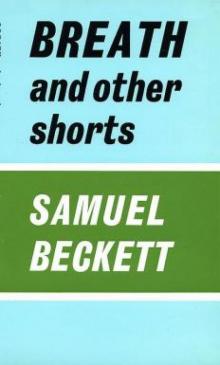 Breath, and Other Shorts
Breath, and Other Shorts Endgame & Act Without Words
Endgame & Act Without Words The Collected Shorter Plays of Samuel Beckett
The Collected Shorter Plays of Samuel Beckett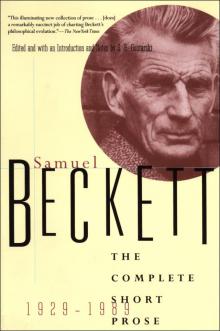 The Complete Short Prose, 1929-1989
The Complete Short Prose, 1929-1989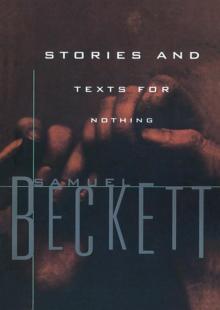 Stories and Texts for Nothing
Stories and Texts for Nothing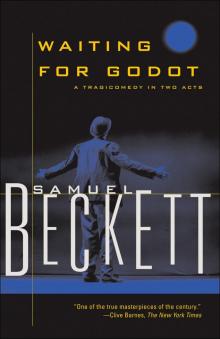 Waiting for Godot
Waiting for Godot Rockaby and Other Short Pieces
Rockaby and Other Short Pieces First Love and Other Shorts
First Love and Other Shorts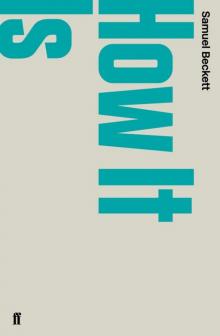 How It Is
How It Is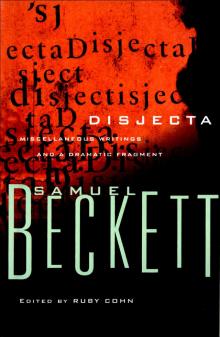 Disjecta: Miscellaneous Writings and a Dramatic Fragment
Disjecta: Miscellaneous Writings and a Dramatic Fragment Echo's Bones
Echo's Bones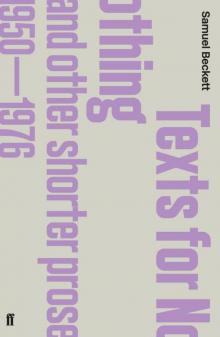 Texts for Nothing and Other Shorter Prose 1950-1976
Texts for Nothing and Other Shorter Prose 1950-1976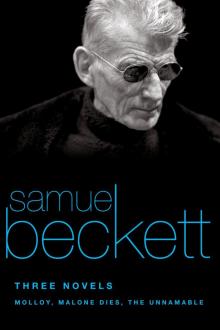 Three Novels
Three Novels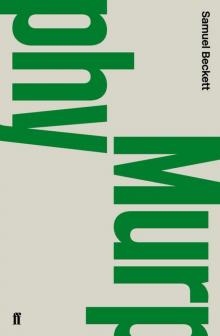 Murphy
Murphy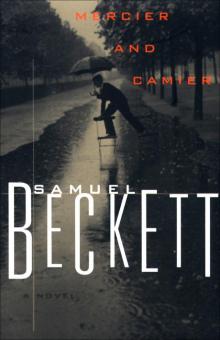 Mercier and Camier
Mercier and Camier Eleuthéria
Eleuthéria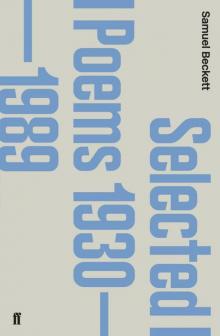 Selected Poems 1930-1988
Selected Poems 1930-1988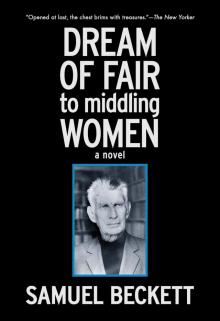 Dream of Fair to Middling Women
Dream of Fair to Middling Women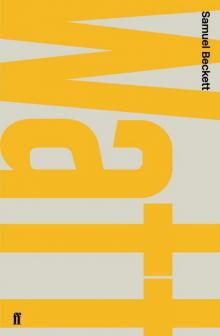 Watt
Watt Krapp's Last Tape and Other Dramatic Pieces
Krapp's Last Tape and Other Dramatic Pieces The Complete Dramatic Works of Samuel Beckett
The Complete Dramatic Works of Samuel Beckett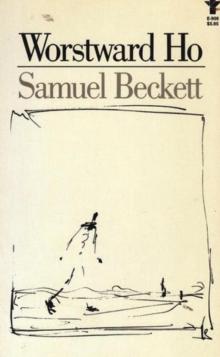 Worstward Ho
Worstward Ho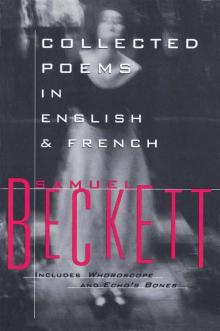 Collected Poems in English and French
Collected Poems in English and French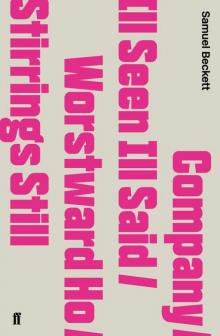 Company / Ill Seen Ill Said / Worstward Ho / Stirrings Still
Company / Ill Seen Ill Said / Worstward Ho / Stirrings Still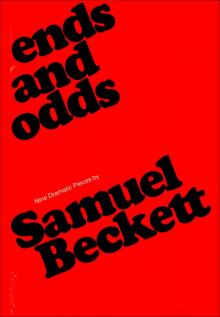 Ends and Odds
Ends and Odds Endgame Act Without Words I
Endgame Act Without Words I Rockabye and Other Short Pieces
Rockabye and Other Short Pieces The Collected Shorter Plays
The Collected Shorter Plays The Complete Dramatic Works
The Complete Dramatic Works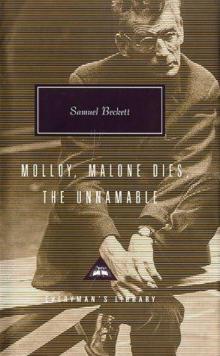 Three Novels: Malloy, Malone Dies, The Unnamable
Three Novels: Malloy, Malone Dies, The Unnamable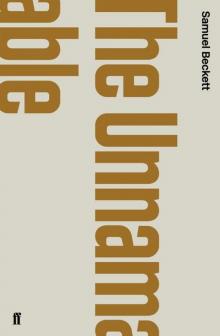 The Unnamable
The Unnamable